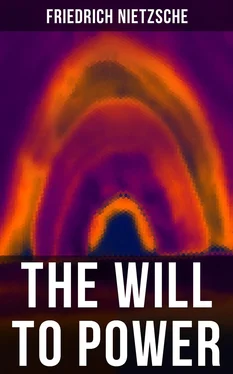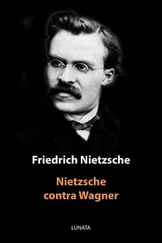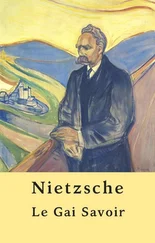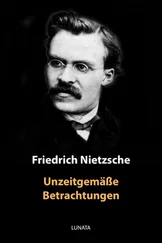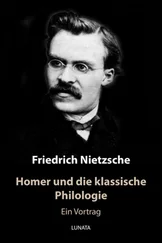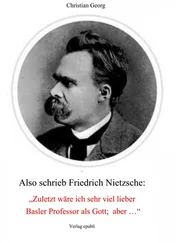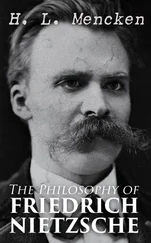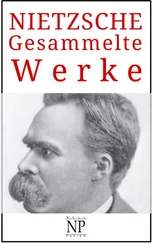C. The stoical type. Firmness, self-control, imperturbability, peace in the form of the rigidity of a will long active—profound quiet, the defensive state, the fortress, the mistrust of war—firmness of principles; the unity of knowledge and will ; great self-respect. The type of the anchorite. The perfect blockhead.
343.
An ideal which is striving to prevail or to assert itself endeavours to further its purpose (a) by laying claim to a spurious origin; (b) by assuming a relationship between itself and the powerful ideals already existing; (c) by means of the thrill produced by mystery, as though an unquestionable power were manifesting itself; (d) by the slander of its opponents' ideals; (e) by a lying teaching of the advantages which follow in its wake, for instance: happiness, spiritual peace, general peace, or even the assistance of a mighty God, etc.—Contributions to the psychology of the idealists: Carlyle, Schiller, Michelet.
Supposing all the means of defence and protection, by means of which an ideal survives, are discovered, is it thereby refuted ? It has merely availed itself of the means of which everything lives and grows—they are all "immoral."
My view: all the forces and instincts which are the source of life are lying beneath the ban of morality : morality is the life-denying instinct. Morality must be annihilated if life is to be emancipated.
344.
To avoid knowing himself is the prudence of the idealist. The idealist: a creature who has reasons for remaining in the dark concerning himself, and who is also clever enough to remain in the dark concerning these reasons also.
345.
The tendency of moral evolution. —Every one's desire is that there should be no other teaching and valuation of things than those by means of which he himself succeeds. Thus the fundamental tendency of the weak and mediocre of all times, has been to enfeeble the strong and to reduce them to the level of the weak: their chief weapon in this process was the moral principle. The attitude of the strong towards the weak is branded as evil; the highest states of the strong become bad bywords.
The struggle of the many against the strong, of the ordinary against the extraordinary, of the weak against the strong: meets with one of its finest interruptions in the fact that the rare, the refined, the more exacting, present themselves as the weak, and repudiate the coarser weapons of power.
346.
(1) The so-called pure instinct for knowledge of all philosophers is dictated to them by their moral "truths," and is only seemingly independent.
(2) The "Moral Truths," "thus shall things be done," are mere states of consciousness of an instinct which has grown tired, "thus and thus are things done by us." The "ideal" is supposed to re-establish and strengthen an instinct; it flatters man to feel he can obey when he is only an automaton.
347.
Morality as a means of seduction. —"Nature is good; for a wise and good God is its cause. Who, therefore, is responsible for the 'corruption of man'? Tyrants and seducers and the ruling classes are responsible—they must be wiped out": this is Rousseau's logic (compare with Pascals logic, which concludes by an appeal to original sin).
Refer also to Luther's logic, which is similar. In both cases a pretext is sought for the introduction of an insatiable lust of revenge as a moral and religious duty. The hatred directed against the ruling classes tries to sanctify itself ... (the "sinfulness of Israel" is the basis of the priest's powerful position).
Compare this with Pauls logic, which is similar. It is always under the cover of God's business that these reactions appear, under the cover of what is right, or of humanity, etc. In the case of Christ the rejoicings of the people appear as the cause of His crucifixion. It was an anti-priestly movement from the beginning. Even in the anti-Semitic movement we find the same trick: the opponent is overcome with moral condemnations, and those who attack him pose as retributive Justice.
348.
The incidents of the fight : the fighter tries to transform his opponent into the exact opposite of himself—imaginatively, of course. He tries to believe in himself to such an extent that he may have the courage necessary for the "good Cause" (as if he were the good Cause ); as if reason, taste, and virtue were being assailed by his opponents.... The belief of which he is most in need, as the strongest means of defence and attack, is the belief in himself, which, however, knows how to misinterpret itself as a belief in 1God. He never pictures the advantages and the uses of victory, but only understands victory for the sake of victory—for God's sake. Every small community (or individual), finding itself involved in a struggle, strives to convince itself of this: " Good taste, good judgment, and virtue are ours. " War urges people to this exaggerated self-esteem ....
349.
Whatever kind of eccentric ideal one may have (whether as a "Christian," a "free-spirit," an "immoralist," or a German Imperialist), one should try to avoid insisting upon its being the ideal; for, by so doing, it is deprived of all its privileged nature. One should have an ideal as a distinction; one should not propagate it, and thus level one's self down to the rest of mankind.
How is it, that in spite of this obvious fact, the majority of idealists indulge in propaganda for their ideal, just as if they had no right to it unless the majority acquiesce therein?—For instance, all those plucky and insignificant girls behave in this way, who claim the right to study Latin and mathematics. What is it urges them to do this? I fear it is the instinct of the herd, and the terror of the herd: they fight for the "emancipation of woman," because they are best able to achieve their own private little distinction by fighting for it under the cover of a charitable movement, under the banner bearing the device "For others."
The cleverness of idealists consists in their persistently posing as the missionaries and "representatives" of an ideal: they thus "beautify" themselves in the eyes of those who still believe in disinterestedness and heroism. Whereas real heroism consists, not in fighting under the banner of self-sacrifice, submission, and disinterestedness, but in not fighting at all .... "I am thus; I will be thus—and you can go to the devil!"
350.
Every ideal assumes love, hate, reverence, and contempt. Either positive feeling is the primum mobile, or negative feeling is. Hatred and contempt are the primum mobile in all the ideals which proceed from resentment.
B. A Criticism of the "Good Man" of the Saint, etc.
Table of Contents
351.
The " good man " Or, hemiplegia of virtue.—In the opinion of every strong and natural man, love and hate, gratitude and revenge, goodness and anger, affirmative and negative action, belong to each other. A man is good on condition that he knows how to be evil; a man is evil, because otherwise he would not know how to be good. Whence comes the morbidness and ideological unnaturalness which repudiates these compounds—which teaches a sort of one-sided efficiency as the highest of all things? Whence this hemiplegia of virtue, the invention of the good man? The object seems to be to make man amputate those instincts which enable him to be an enemy, to be harmful, to be angry, and to insist upon revenge.... This unnaturalness, then, corresponds to that dualistic concept of a wholly good and of a wholly bad creature (God, Spirit, Man); in the first are found all the positive, in the second all the negative forces, intentions, and states. This method of valuing thus believes itself to be "idealistic"; it never doubts that in its concept of the "good man," it has found the highest desideratum. When aspiring to its zenith it fancies a state in which all evil is wiped out, and in which only good creatures have actually remained over. It does not therefore regard the mutual dependence of the opposites good and evil as proved. On the contrary, the latter ought to vanish, and the former should remain. The first has a right to exist, the second ought not to be with us at all.... What, as a matter of fact, is the reason of this desire? In all ages, and particularly in the Christian age, much labour has been spent in trying to reduce men to this one-sided activity: and even to-day, among those who have been deformed and weakened by the Church, people are not lacking who desire precisely the same thing with their "humanisation" generally, or with their "Will of God," or with their "Salvation of the Soul." The principal injunction behind all these things is, that man should no longer do anything evil, that he should under no circumstances be harmful or desire harm. The way to arrive at this state of affairs is to amputate all hostile tendencies, to suppress all the instincts of resentment, and to establish "spiritual peace" as a chronic disease.
Читать дальше
